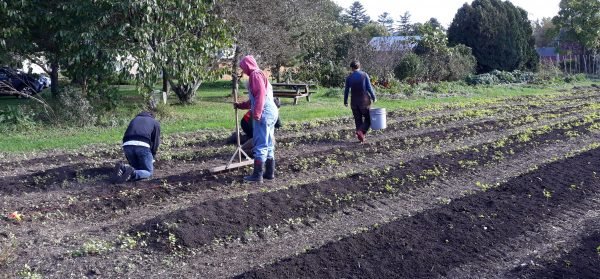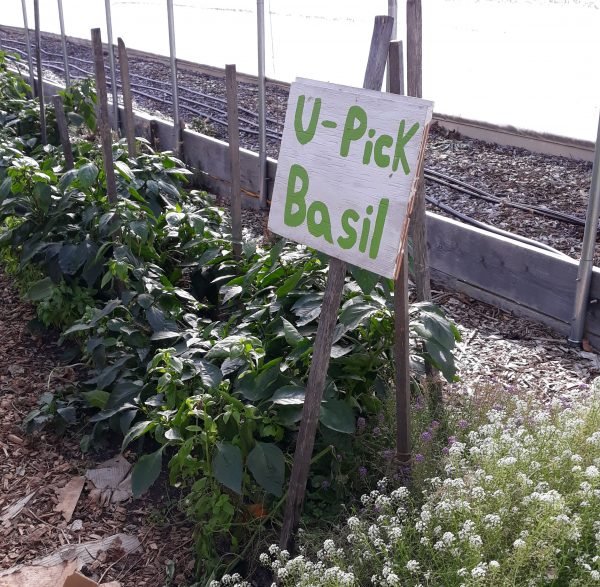Published November 6, 2021 in the Daily Hampshire Gazette
By Jacob Nelson
For the Gazette
What does it mean to grow, sell, and eat food ethically? From when seeds hit the soil to when dinner hits your plate, what does that actually look like?
In our interconnected world, what’s “ethical” is complex and relative to where you are. Sawyer Farm in Worthington built their operation based on their understanding of ethical farming for their land and community and continues to reshape it.
“We have 45 acres,” says farmer Lincoln Fishman. “Half is open and about half wooded. There’s five acres of vegetables and the rest is pasture for animals or hay-making.” Fishman and his wife, Hillary Costa, began farming there in 2010. Today, Butch Flowers, Erica Terpening, and Emily Trantanella round out Sawyer Farm’s core team.
As Fishman explains, “to us, being ethical means minimizing the negative impacts we pass on.” Ethical perfection is impossible, he acknowledges – or maybe laments. In practice, “we’re just trying to do the best we can where we are,” he says.
Fishman is inspired by what he calls the “golden age of agriculture,” a period between the Civil War and the Great Depression. Farmers were learning more about plant and soil science and innovating with draft animals and simple, durable tools, which combined to make farming more efficient while conserving resources. Yet as fossil fuels and chemicals gained prominence, that model of agriculture was largely left behind, he says.
Sawyer Farm tries to combine strategies from that “golden age” with modern innovation. They cover crop and reduce tilling to build soil fertility, and for the past 11 years have used a team of draft horses for bigger jobs.
Fishman and Costa gained experience driving a team while working at Essex Farm in Essex, New York, popularized by the book “The Dirty Life.” When starting Sawyer Farm, they brought with them not only an interest in horse power, but also Essex Farm’s model of a whole-diet community supported agriculture (CSA) business.
Fishman explains what this means. “We built a farm ecosystem that could feed a small community a complete diet, year-round, with a diversity of different foods.” Members who purchased a share could theoretically get everything they need from the farm – vegetables, dairy, meat, some grains and beans, and even bread and yogurt. From a farming perspective, that meant growing just enough seasonal crops, like tomatoes and tender greens, and a whole lot of storage crops, which remain the farm’s specialty.
The whole diet CSA ran for six years, but Fishman and his partners found that their interest in growing a full diet was ahead of the community’s interest in eating so seasonally from one piece of land.
“Recreating agriculture has to go hand in hand with recreating eating habits,” says Fishman. But most of us grew up eating outside local rhythms. “It’s a lot to tell someone ‘sorry, but it’s not broccoli season for the next eight months’,” he continues, “when that’s what they like and know how to cook.”
Plus, with Fishman and Costa’s first child just born, Costa especially had much less time. “She had been farming and making bread, yogurt, and ricotta for members every week,” says Fishman, and that became unsustainable.
In 2017 Sawyer Farm was reinvented, selling wholesale and building a self-serve retail store right at the farm (on Sawyer Road in Worthington). Basically, they attempted to widen their circle, selling more kinds of food to more people, without watering down their commitment to feed people ethically.
“We think about the store as a giant version our pantry,” says Fishman. “We’re doing most of the research for you in terms of this food’s health quality and impact on the environment,” making it easier for customers who share their views to shop with confidence.
The bulk of the food comes right from their farm, with the storage crops they’re known for and skilled at growing front and center. Things like root veggies, winter squash, cabbage – even dry beans and corn for milling into masa. Many of these are coming in from the field now and will be sold throughout next year.
They also buy in food from other farms to fill in the gaps, starting with their immediate neighbors like Kinnebrook Farm in Worthington (grass-fed beef) and Underline Farm in Ashfield (pastured chicken).
What they can’t source from adjacent towns they buy from Marty’s Local, a distributor that aggregates food from many local farms in the region (including Sawyer Farm) and resells it to businesses and individuals. Things like dairy, honey, and maple syrup arrive this way, as do pantry staples that meet Sawyer Farm’s standards, like regionally grown flour or well-sourced coffee that’s locally roasted.
Stocking enough variety to be a one-stop-shop for customers has been a boon during COVID-19, as people look to shop at fewer, smaller stores with a reliable food supply. Sales have skyrocketed, says Fishman, increasing tenfold in the spring of 2020 and remaining four times higher than years prior.
They have managed some of the increased demand thanks to a Food Security Infrastructure Grant, applied for with the help of Community Involved in Sustaining Agriculture (CISA). This provided funds for new coolers and the conversion of shipping containers into giant walk in refrigerators to better store root crops.
The store accepts SNAP (Supplemental Nutrition Assistance Program) and, since the pandemic started, they have offered their own Community 20 Fund to help with food affordability. “When people check out,” Fishman explains, “they have an option to donate to the fund or use it to take 20% off their purchase. It’s all done on the honor system. So far, donations and use have been basically even each month.”
The world is a complicated place. Figuring out how to live and eat here responsibly is no small task, though buying local does make it easier to see the impacts of your choices.
Jacob Nelson is communications coordinator for CISA (Community Involved in Sustaining Agriculture). To learn more about local farms and farm stores in your neck of the woods, visit buylocalfood.org/find-it-locally.



